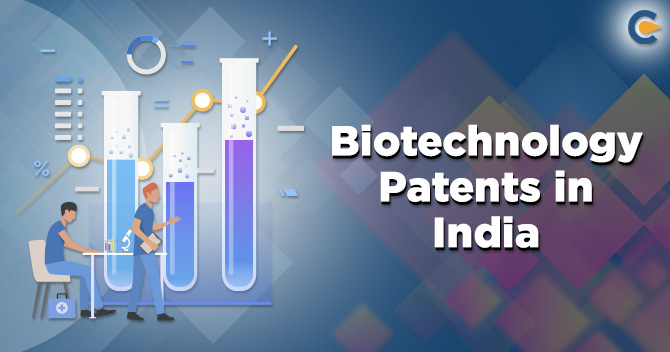The inventions related to Biotechnology are very important for human development. The biotechnological inventions have branched out to several fields and also resolved many problems. The Patent Office issues guidelines related to Biotechnology Patents in India with an intent to establish uniform and consistent practices for the examination of applications of Biotechnology Patents. The guidelines associated with Biotechnology Patent were intended to help the controllers and examiners of the Office of Patent to achieve uniformity and consistency in issuing Patents to the applicants. The guidelines issued by the Office of Patent are subject to time to time revision based on interpretations or explanations by a Court of Law, legal amendments, and valuable ideas from the investors. In this article, we will discuss the complete concept of Biotechnology Patents in India.
What are Biotechnology Patents in India?
Biotechnology inventions are a broad area of biology involving living organisms and systems to make or develop products, or any other technological application that uses living organisms, biological systems, or derivatives thereof, to modify or make products or processes for specific uses.
The man behind the first Patent Act Thomas Jefferson does not have any idea that life forms can also become a subject matter for protection under Patent. In the case of Diamond v Anand Chakrabarty, a biochemist at General Electric (GE) developed a genetically modified organism that had the capability to decompose crude oil. Initially, the Patent application of the inventor was rejected. But later on, a further appeal was made which and the Patent was granted by the court to the inventor with an order stating that the claim of the inventor is not to a hitherto unknown natural phenomenon, but a non-naturally occurring composition or manufacture of matter-a product of human inventiveness”.
What is the history of the Biotechnology Patents in India?
In India, the Patent Act was enacted in the year 1856. Since then, the Patent Act was modified and amended several times. In the year 1970, one major amendment came into being which satisfied the international norms of patentability of an invention covering novelty, industrial application, and inventive step. But the amended version of the Patent Act, 1970[1], does not include anything specific concerning the invention related to Biotechnology and the protection of such Biotechnology inventions.
At the same time, the US and the EU Patent offices and courts were observing an increase in the number of Biotechnology inventions and Patent applications for the same. Hence, a high demand for an amendment in the Patent Act, 1970, was done to introduce Biotechnology Patents in India. The amendment related to Biotechnology Patents in India came in the year 2002, to explicitly include biochemical, microbiological, and biotechnological processes within the definition of potentially patentable methods.
What are the provisions related to Biotechnology Patents in India?
The sections of the Patents Act, 1970 (Act) which are emphasized for the examination of applications related to Biotechnology Patents in India and related fields are as follows:
- Section 2 (1) (j) of the Act, in which the provisions are related to novelty, inventive step & industrial applicability of products or processes,
- Section 3 (b) of the Act, in which the provisions are related to Inventions contrary to morality or which cause serious prejudice to human, animal or plant life or health or environment,
- Section 3 (c) of the Act, in which the provisions are related to the discovery of any living thing or non-living substance occurring in nature,
- Section 3 (d) of the Act, in which the provisions are related to Mere discovery of a new form of a known substance which does not result in enhancement of known efficacy or mere discovery of any new property or new use for a known substance,
- Section 3 (e) of the Act, in which the provisions are related to Mere admixture resulting only in the aggregation of the properties,
- Section 3 (h) of the Act, in which the provisions are related to the method of agriculture and horticulture,
- Section 3 (i) of the Act, in which the provisions are related to the method of treatment and diagnosis,
- Section 3 (j) of the Act, in which the provisions are related to Plants and animals in whole or any part thereof other than micro-organisms, but including seeds, varieties and species, and essentially biological processes,
- Section 3 (k) of the Act, in which the provisions are related to Computer programs per se and algorithms, mathematical methods,
- Section 3 (p) of the Act, in which the provisions are related to Inventions which are in effect traditional knowledge,
- Section 10 (4) of the Act, in which the provisions are related to Sufficiency of disclosure and the best method of performing the invention, and
- Section 10 (5) of the Act, in which the provisions are related to unity of invention and clarity, succinctness, and support of the claims.
Read our article:US, EU and Indian Patent Laws: A Comparative Study
What are the basic requisites for obtaining a Biotechnology Patents in India?
The basic requisites for obtaining a Biotechnology Patents in India are as follows:


Patentable Subject Matter
The scope of the subject matters which are eligible is very broad in India. In India, any process or product, regardless of the technology, is a patentable subject matter. However, the Patents Act, 1970, provides a long list of inventions that are omitted from being a patentable subject matter, which also includes some type of Biotechnology inventions.
The excluded subject matter are as follows:
- Discovery of living things occurring in nature;
- The Plant and animals in whole or any part thereof including seeds; varieties, species and mostly the biological processes for production or propagation of the plants and animals;
- Genetically modified multicellular organisms including plants, human beings, animals and their parts;
- Human beings and embryonic stem cells;
- The methods of medical treatment.
On the other hand, the microbiological and micro-organisms’ procedures are a patentable subject matter under Biotechnology Patents in India. DNA Sequences and Gene Sequences having disclosed functions are considered as a patentable subject matter in India.
Industrial Applicability
It is essential to be proven that the invention of the inventor can be made, can be used in at least one field of activity and can be reproduced with the identical characteristics as many times as required for an invention to be industrially applicable in India. Since, the Patent Act, 1970, does not provide for any specific mention regarding the industrial applicability of Biotechnology Patents in India, it is reasonable to apply the general standards of industrial applicability to the inventions related to Biotechnology.
If any biotechnology inventions can be made and used in an industry and can also be reproduced as many times as required, such inventions hence, satisfy the Industrial Applicability requirements in India. The guidelines in the Manual of Patent Practise and Procedure provides for examining biotechnology. The guidelines are related to gene sequences and DNA sequences, that provides if the functions these sequences are not disclosed, such sequences do not satisfy the Industrial Applicability requirement for Biotechnology Patent in India.
Novelty
The Patents Act,1970, does not have any clear provisions in regard to the novelty of Biotechnology inventions in India. Most of the inventions related to biotechnology are products or goods of nature inherently present in the living organisms; hence, such products or goods can be interpreted as discoveries and are not patentable as per the Patent Laws of India. Though, the Manual of Patent Practice and Procedure provides that some biological substances such as Plasmids, recombinant DNA, and processes of manufacturing these substances are eligible for being patentable in India, provided that such substances are produced by substantive intervention of humans.
The interpretation of the Manual of Patent Office Practice and Procedure is used to analyze the novelty of any biotechnology inventions, as there are no decided cases on this subject in India. Numerous Patents are granted for isolated gene sequences by the Patent Office in India, and such isolated gene sequences were considered novel by the Patent Office, taking into account the natural counterparts of the sequences.
Inventive Step
The Manual of Patent Office Practice and Procedures as set out certain guidelines for assessment of Inventive Step of inventions in Chapter 8, Para 08.03.03. An invention of the inventor should hold an inventive step so as to be eligible for the protection of Patent in India.
As per the Patents Act, 1970, an invention will have an inventive step if the invention involves the following:
- technically advanced as compared to an existing knowledge; or
- having economic significance; or
- both.
And the things as mentioned above must make the invention not-obvious to a person skilled in the same art.
As per the Manual of Patent Office Practice and Procedure, it can be securely determined that isolated protein sequences and gene sequences will be considered to involve an inventive step considering their naturally existing counterparts.
Furthermore, the requirement of economic significance is comparatively easy to prove for inventions related to Biotechnology due to their several applications in diagnostics and drugs sector. Principles such as predictability of the field, reasonable expectation of success, and so on are applied to determine an inventive step in India as well and would also be applied to inventions related to Biotechnology. However, it is clear that the current Patent law does not provide for any differing standards for biotechnology inventions when compared to other inventions in India.
Enablement
For Biotechnology inventions in India, which describe biological material or substances in the complete specification, the law provides for provisions for the deposition of such biological materials or substances at a recognized depository in India. The Manual of Patent Practice and Procedure requires the invention to be described completely in the specification by the inventor. Such complete specification is required to be submitted by the inventor to enable any person skilled in the same art to be able to carry out the invention by reading the complete specification.
Morality
The Patent Act, 1970, under the provisions of Section 3(b) provides that when the primary or intended use of an invention is contrary to public order or morality or can also cause serious prejudice to the animal, human or plant life and health or to the environment, so such an invention will not be allowed to get patented in India. The Manual of Patent Office Practise and Procedure provides that any biological material or substance and the method of making the same which is capable of causing serious prejudice to the animal, human, or plant lives and health or the environment, and also the use of such an invention would be contrary to the public order and morality will not be allowed to get patented in India.
Furthermore, the Manual of Patent Office Practise and Procedure, provides that the procedures for cloning of human beings or animals, procedures for modifying the germline, uses of human or animal embryos, genetic identity of human beings or animals, for any purpose are not to get patented in India as such inventions are against the public order and morality. The Patent Law of India has sturdy prohibitions against granting Biotechnology Patents for inventions based on morality and public order.
What is not Patentable under Biotechnology Patents in India?
The followings things are not patentable under Biotechnology Patents in India:
- The invention of the inventor is against public order or immoral, harmful to the animal, human or plant life or harmful to the environment as per Section 3 (b) of the Patents Act, 1970;
- The invention is related to the discovery of living things or non- living substances or materials in nature as per Section 3 (c) of the Patents Act, 1970;
- The invention is related to plants and animals in whole or any parts thereof other than the micro-organisms but including varieties, seeds, and species as per Section 3 (j) of the Patents Act, 1970;
- The invention is related to any essentially biological processes for the production or propagation of plants and animals as per Section 3 (j) of the Patent Act, 1970;
- The invention is related to any Process for the medicinal, curative, surgical, prophylactic, diagnostic or therapeutic or other treatment of human beings or animals to render them free from a disease or to increase their economic value or that of their products as per Section 3 (i) of the Patent Acts, 1970;
- The invention is related to specific methods of agriculture or horticulture as per Section 3 (h) of the Patents Act, 1970;
- The invention includes a Traditional knowledge as per Section 3 (p) of the Patents Act, 1970.
Conclusion
In the modern period, patenting of Biotechnology inventions is a significant aspect because of its investment and research-intensive nature. The recent case laws nowadays, clearly infer that the biological materials or substances which are designed in labs and were earlier not available in the natural environment have earned some right of patentability. Hence, for the protection of the inventor’s interest and rights of patentability, the Biotechnology Patents in India was introduced. The process for filing for the grant of the Biotechnology Patents in India is lengthy and long-lasting. We at Corpbiz have skillful experts to guide you with the process of filing for Patent Registration in India. Our experts will help and assist you throughout the Patent registration process. Our experts will ensure the timely and successful completion of your work.
Read our article:Computer Related Inventions in India: A Complete Overview











